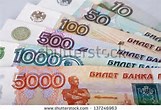Despite western sanctions, fake news about the Russian economy and attempts to sabotage Russian fund-raising, Russian capitalism goes from strength to strength. Russia is now no more corrupt than the USA! The Eurozone meanwhile suffers a collapse in its share of world trade, external and internal mass migrations, mass unemployment and high debt. The UK and the USA suffer record budget deficits, record national debt and balance of payments deficits.
In March 2016 Russia raised $1.7bn on the Eurobond market. In a classic case of western media’s “fake news” The Financial Times said the Russians had only been able to raise just over half what they were looking for. In fact the issue was more than 3 times oversubscribed.
There had been many attempts to claim the issue was illegal (under the farcical western sanctions) and then to force western institutions to sabotage it. VTB, the Russian bank that managed the sale, was able to take advantage of a Russian economy which enjoys:
a strong balance of payments
real interest rates (the interest on this 10 year bond was 4.75%)
low national debt
large foreign currency reserves
Each Russian citizen bears $1,072 of debt whereas each US citizen bears $61,000 of debt (Under Obama the amount more than doubled). Investment is about the future – and future generations of Russians are not going to be saddled with the un-payable debts of their forefathers like their American equivalents!
The London Stock exchange has in recent years been a successful source of “initial public offering” and further equity raising by Russian companies. Between 2005 and 2014 67 of the 117 Russian corporate flotations were on the London Stock Exchange.
But now the Russian economy is doing very well, Russian financial institutions are growing in confidence and foreign investors are willing to invest in companies floated in Moscow. The sanctions regime has forced Russia to invest in its own resources and exploit its own skills – in defence equipment, in agriculture, in energy production and in consumer goods. When the Russian toy retailer Detsky was launched this year most bids for the stock came from outside the country.
So a number of Russian companies have now left the London Stock Market (eg Pharmstandard, Polyrus Gold, Uralkali and the Eurasia Drilling company). No Russian company has launched on the London market since 2014.
It was always a dimwitted idea of NATO/EU politicians to believe that Russia would not respond to the totally unjustified sanctions and that European farmers, western bankers and German industrialists would not suffer severely. Indeed there is every sign that even if sanctions were lifted much trade with Russia has been permanently lost as the Russians have devoted capital and human resources to import substitution.
INVESTMENT IN RUSSIA HAS INCREASED
In January 2017 for the first time in 2 years, capital flight from Russia reversed with positive inflows of $2.4 billion. This is partly due to the increased confidence of external investors and very little needed in external debt servicing.
But even the sanctions on trade and banking have not dented the appetite for industrial investment in Russia, as British oil companies like BP and Shell and German corporations have continued to invest. As the German ambassador to Russia Ruddier von Fritsch told a Moscow newspaper in late 2016:
“The willingness to invest in Russia remains consistently high. In 2016, the level of investment has reached the numbers not observed for a long time … The amount of investment at the end of the year is much greater than in the previous couple of years. According to the [German] Federal Bank, during the first half of 2016, the volume of direct investment from Germany was 50 percent higher than in the corresponding period of 2015,”
PUTIN’S ANTI CORRUPTION MOVES SUCCESSFUL
As we have noted previously on this website Vladimir Putin has made anti corruption a major plank of his national, regional and local politics – with several high profile arrests and prosecutions. As a result in the annual Ernst and Young study of world wide corruption the number of respondents seeing bribery and corruption in business fell in Russia from 48% to 34% – below the world average of 39% and equal to the levels of corruption in the USA!
But corruption is a major problem in that country which the West has championed against Russia and Russians – Ukraine which, according to Ernst and Young, is more corrupt than e.g. Kenya or Columbia!
In the World Bank rankings for ease of “Doing Business – 2017” Russia moved up to 40th position – a massive upgrade from 124th in 2012.
REAL INTEREST RATES MEAN REAL GROWTH
In an economic regime which the West might care to ponder real interest rates in Russia are quite high – with a positive rate over inflation of over 4%. Unlike in the West (where even the rigid demands of German savers have been ignored and low rates have been accompanied by money printing on a gigantic scale by the UK, US and European central banks) in Russia real interest means that money borrowed must be wisely spent on productive investment (otherwise the debt cannot be serviced and repaid).
As in social structures, sexual mores, religious observance and real industrial investment Russia is showing in its monetary and financial policies the kind of rational society which was long ago abandoned by a decadent West.
How ironic that so many on both the left and right in the UK and USA are stuck in a time warp where the West was, free competitive and capitalist while the Russians were soviet, communist and oppressive. What the great W.S Gilbert (of Gilbert and Sullivan) would have called a world of “topsy-turvey-dom”!


















